Virtual Counseling Report: 7 Cups, Micro Skills, and Ethical Issues
VerifiedAdded on 2022/11/26
|16
|4252
|458
Report
AI Summary
This report delves into the realm of virtual counseling, exploring the efficacy of online therapy platforms, specifically focusing on the 7 Cups website. It begins with a personal account of the author's experience as a volunteer listener on the platform, providing insights into its quality and functionality. The report then defines counseling and virtual counseling, highlighting the benefits and challenges of internet-based therapy. A significant portion of the report is dedicated to discussing micro skills essential for effective counseling, including examining behavior, questioning techniques (open and closed questions), confrontation, and focusing strategies. Ethical and legal considerations in counseling are also addressed. The report concludes with an overview of the key findings and insights gained from the research and the practical experience on 7 Cups.

Running head: Virtual counseling 0
Virtual Counseling
201
9
Virtual Counseling
201
9
Paraphrase This Document
Need a fresh take? Get an instant paraphrase of this document with our AI Paraphraser
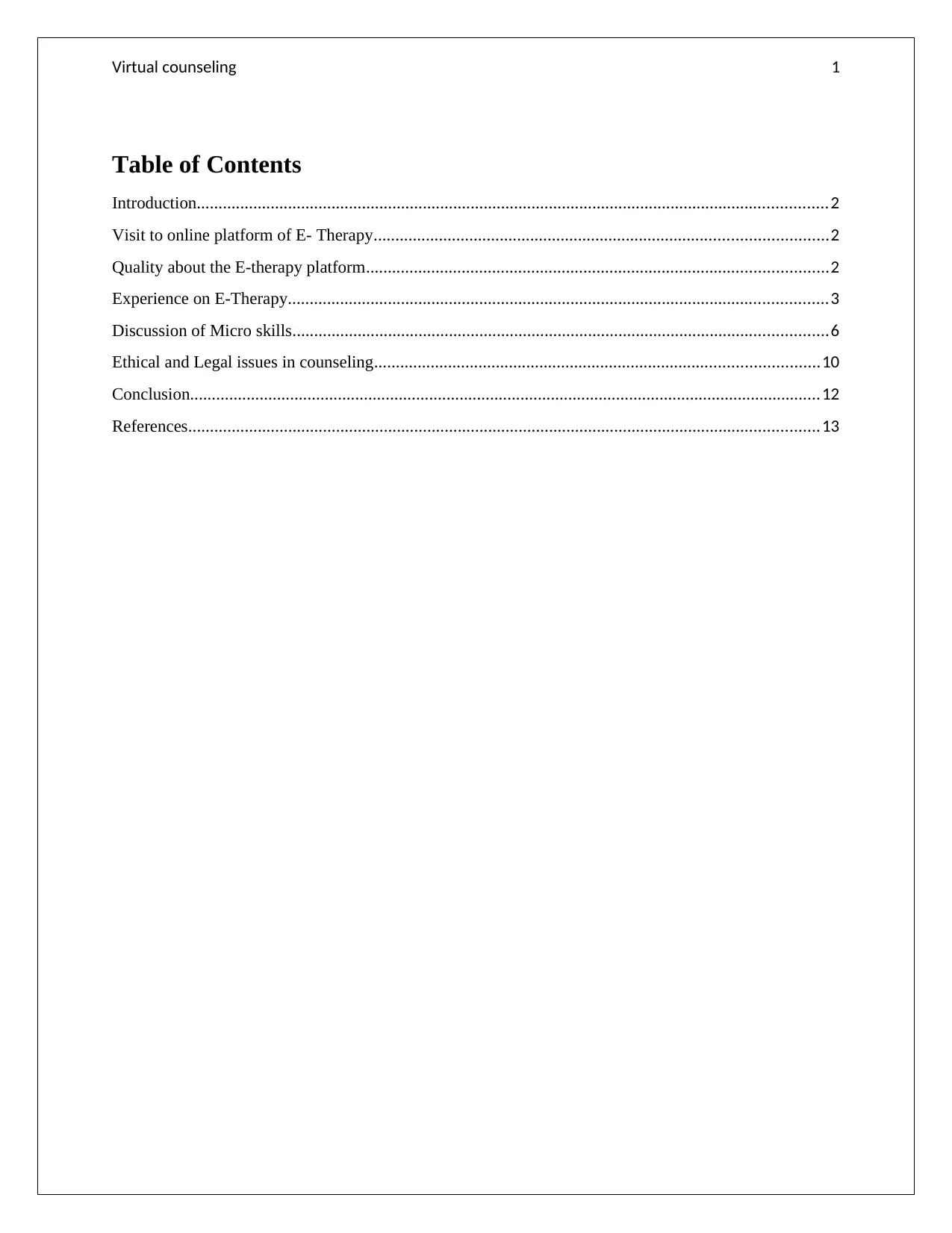
Virtual counseling 1
Table of Contents
Introduction.................................................................................................................................................2
Visit to online platform of E- Therapy........................................................................................................2
Quality about the E-therapy platform..........................................................................................................2
Experience on E-Therapy............................................................................................................................3
Discussion of Micro skills...........................................................................................................................6
Ethical and Legal issues in counseling......................................................................................................10
Conclusion.................................................................................................................................................12
References.................................................................................................................................................13
Table of Contents
Introduction.................................................................................................................................................2
Visit to online platform of E- Therapy........................................................................................................2
Quality about the E-therapy platform..........................................................................................................2
Experience on E-Therapy............................................................................................................................3
Discussion of Micro skills...........................................................................................................................6
Ethical and Legal issues in counseling......................................................................................................10
Conclusion.................................................................................................................................................12
References.................................................................................................................................................13
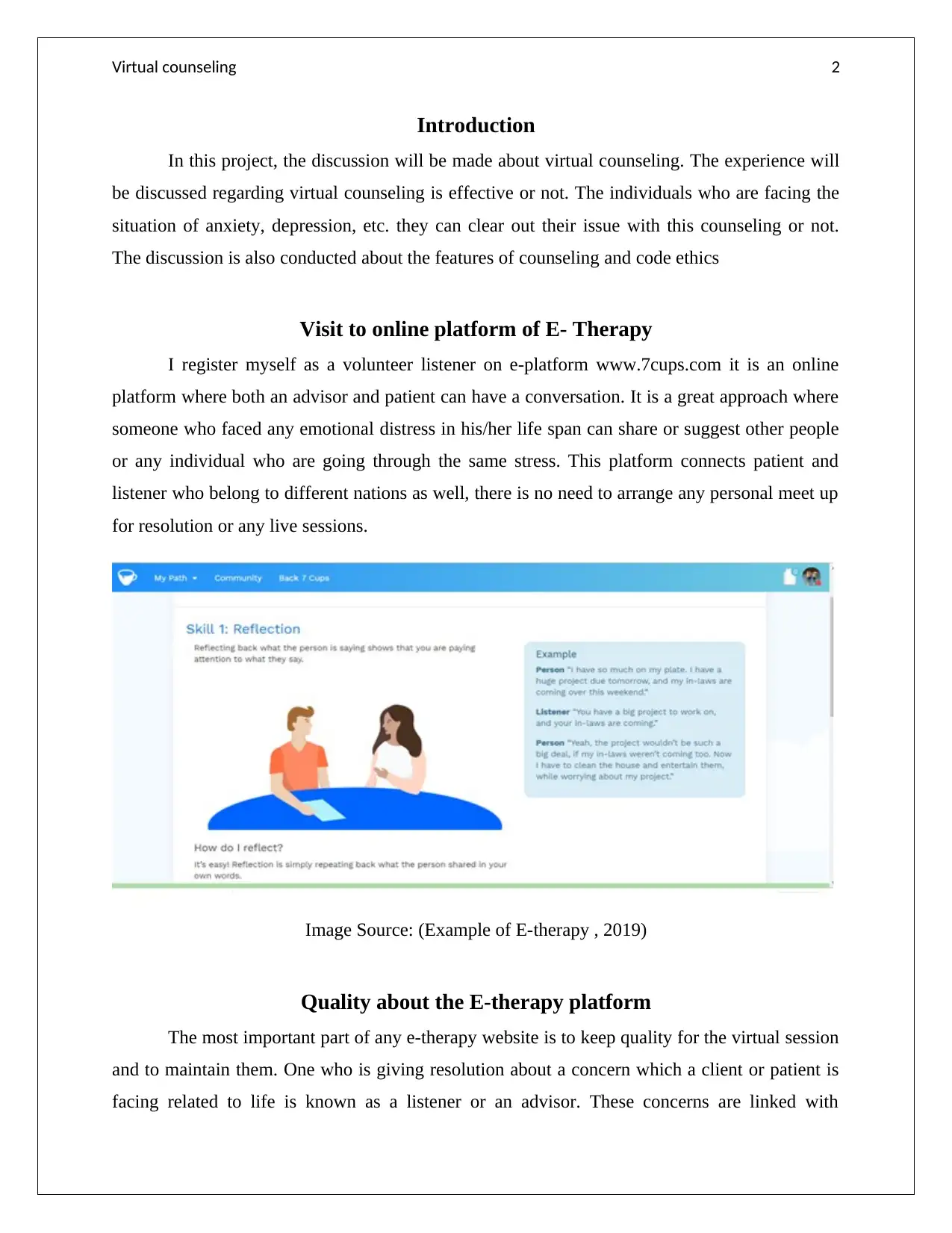
Virtual counseling 2
Introduction
In this project, the discussion will be made about virtual counseling. The experience will
be discussed regarding virtual counseling is effective or not. The individuals who are facing the
situation of anxiety, depression, etc. they can clear out their issue with this counseling or not.
The discussion is also conducted about the features of counseling and code ethics
Visit to online platform of E- Therapy
I register myself as a volunteer listener on e-platform www.7cups.com it is an online
platform where both an advisor and patient can have a conversation. It is a great approach where
someone who faced any emotional distress in his/her life span can share or suggest other people
or any individual who are going through the same stress. This platform connects patient and
listener who belong to different nations as well, there is no need to arrange any personal meet up
for resolution or any live sessions.
Image Source: (Example of E-therapy , 2019)
Quality about the E-therapy platform
The most important part of any e-therapy website is to keep quality for the virtual session
and to maintain them. One who is giving resolution about a concern which a client or patient is
facing related to life is known as a listener or an advisor. These concerns are linked with
Introduction
In this project, the discussion will be made about virtual counseling. The experience will
be discussed regarding virtual counseling is effective or not. The individuals who are facing the
situation of anxiety, depression, etc. they can clear out their issue with this counseling or not.
The discussion is also conducted about the features of counseling and code ethics
Visit to online platform of E- Therapy
I register myself as a volunteer listener on e-platform www.7cups.com it is an online
platform where both an advisor and patient can have a conversation. It is a great approach where
someone who faced any emotional distress in his/her life span can share or suggest other people
or any individual who are going through the same stress. This platform connects patient and
listener who belong to different nations as well, there is no need to arrange any personal meet up
for resolution or any live sessions.
Image Source: (Example of E-therapy , 2019)
Quality about the E-therapy platform
The most important part of any e-therapy website is to keep quality for the virtual session
and to maintain them. One who is giving resolution about a concern which a client or patient is
facing related to life is known as a listener or an advisor. These concerns are linked with
⊘ This is a preview!⊘
Do you want full access?
Subscribe today to unlock all pages.

Trusted by 1+ million students worldwide
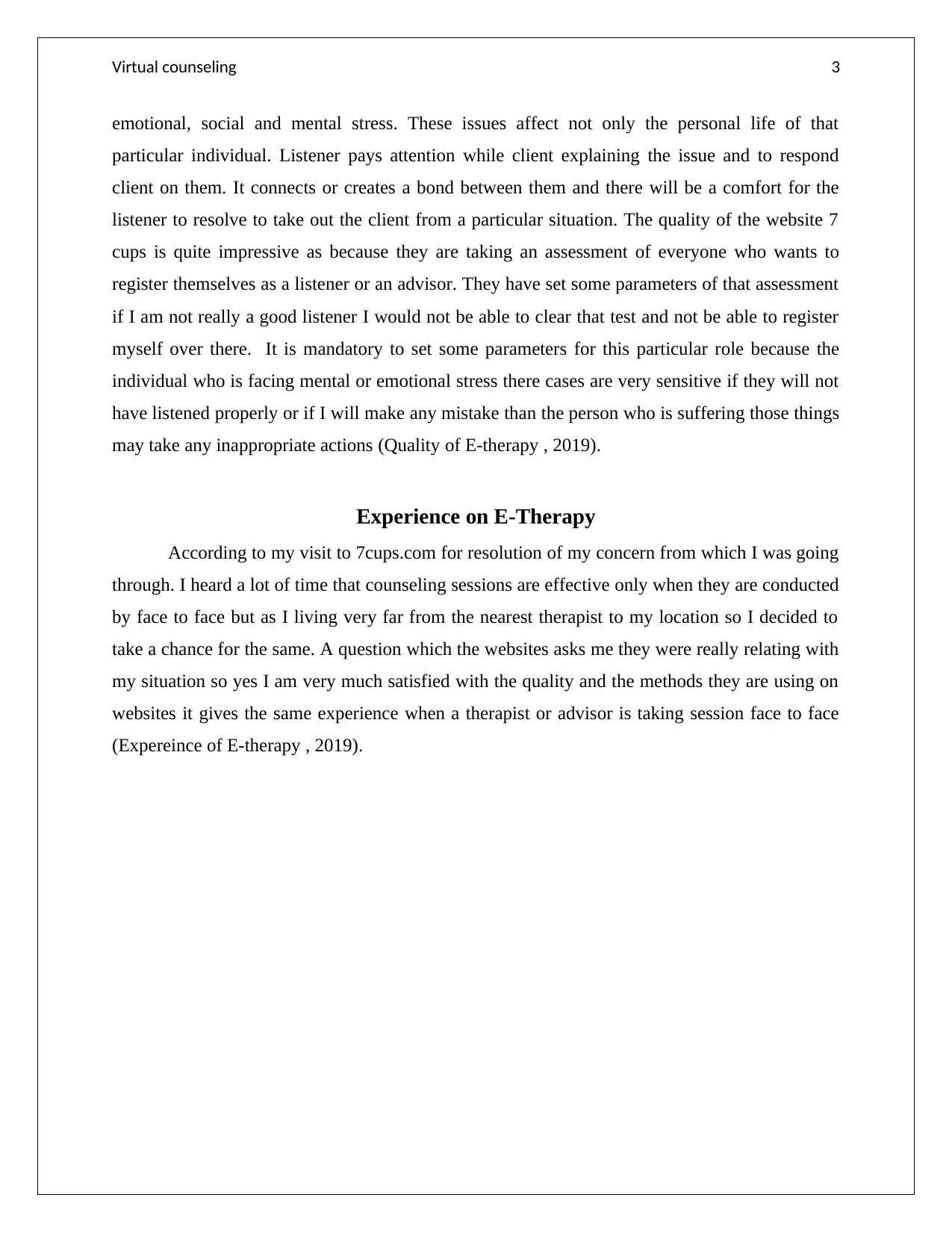
Virtual counseling 3
emotional, social and mental stress. These issues affect not only the personal life of that
particular individual. Listener pays attention while client explaining the issue and to respond
client on them. It connects or creates a bond between them and there will be a comfort for the
listener to resolve to take out the client from a particular situation. The quality of the website 7
cups is quite impressive as because they are taking an assessment of everyone who wants to
register themselves as a listener or an advisor. They have set some parameters of that assessment
if I am not really a good listener I would not be able to clear that test and not be able to register
myself over there. It is mandatory to set some parameters for this particular role because the
individual who is facing mental or emotional stress there cases are very sensitive if they will not
have listened properly or if I will make any mistake than the person who is suffering those things
may take any inappropriate actions (Quality of E-therapy , 2019).
Experience on E-Therapy
According to my visit to 7cups.com for resolution of my concern from which I was going
through. I heard a lot of time that counseling sessions are effective only when they are conducted
by face to face but as I living very far from the nearest therapist to my location so I decided to
take a chance for the same. A question which the websites asks me they were really relating with
my situation so yes I am very much satisfied with the quality and the methods they are using on
websites it gives the same experience when a therapist or advisor is taking session face to face
(Expereince of E-therapy , 2019).
emotional, social and mental stress. These issues affect not only the personal life of that
particular individual. Listener pays attention while client explaining the issue and to respond
client on them. It connects or creates a bond between them and there will be a comfort for the
listener to resolve to take out the client from a particular situation. The quality of the website 7
cups is quite impressive as because they are taking an assessment of everyone who wants to
register themselves as a listener or an advisor. They have set some parameters of that assessment
if I am not really a good listener I would not be able to clear that test and not be able to register
myself over there. It is mandatory to set some parameters for this particular role because the
individual who is facing mental or emotional stress there cases are very sensitive if they will not
have listened properly or if I will make any mistake than the person who is suffering those things
may take any inappropriate actions (Quality of E-therapy , 2019).
Experience on E-Therapy
According to my visit to 7cups.com for resolution of my concern from which I was going
through. I heard a lot of time that counseling sessions are effective only when they are conducted
by face to face but as I living very far from the nearest therapist to my location so I decided to
take a chance for the same. A question which the websites asks me they were really relating with
my situation so yes I am very much satisfied with the quality and the methods they are using on
websites it gives the same experience when a therapist or advisor is taking session face to face
(Expereince of E-therapy , 2019).
Paraphrase This Document
Need a fresh take? Get an instant paraphrase of this document with our AI Paraphraser
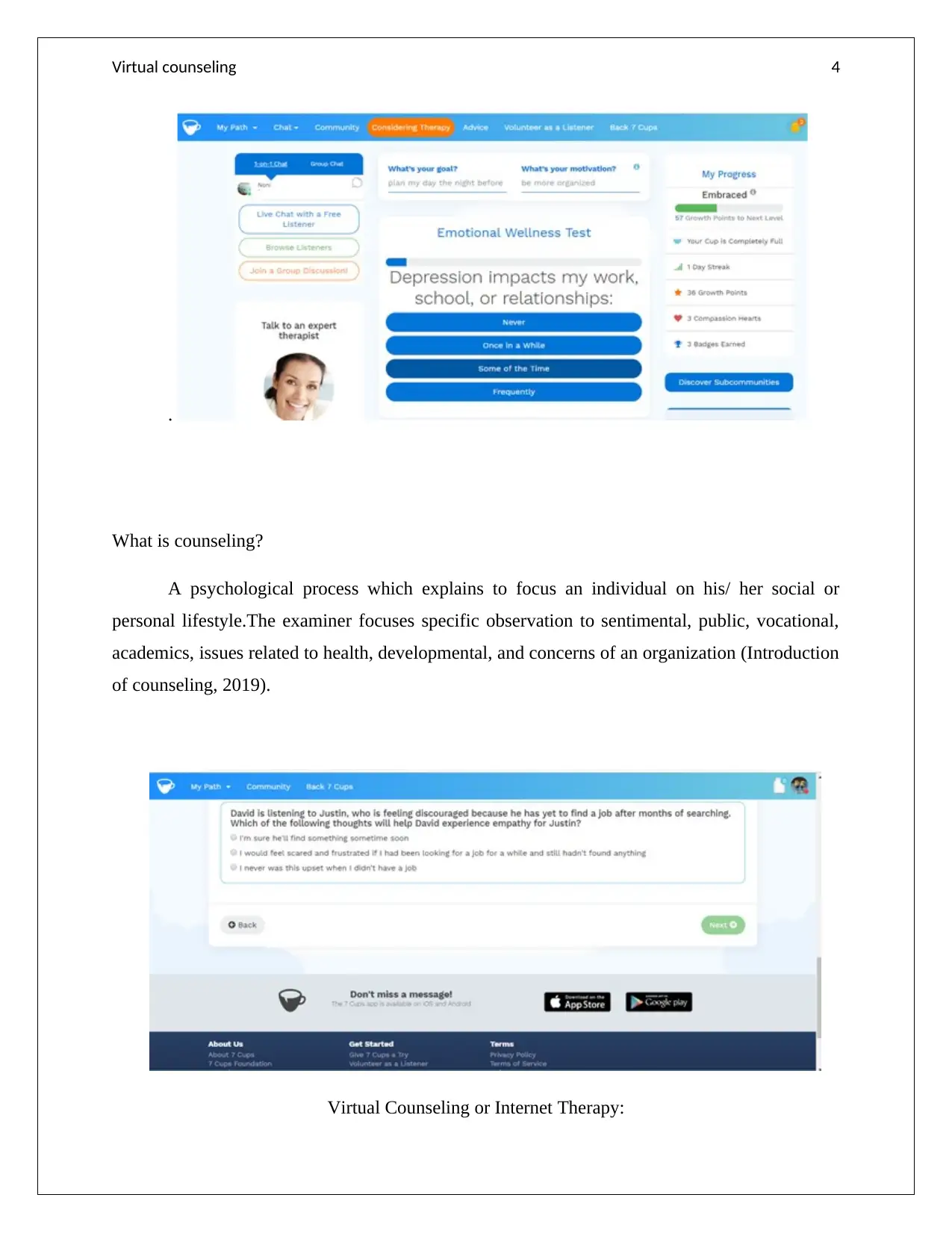
Virtual counseling 4
.
What is counseling?
A psychological process which explains to focus an individual on his/ her social or
personal lifestyle.The examiner focuses specific observation to sentimental, public, vocational,
academics, issues related to health, developmental, and concerns of an organization (Introduction
of counseling, 2019).
Virtual Counseling or Internet Therapy:
.
What is counseling?
A psychological process which explains to focus an individual on his/ her social or
personal lifestyle.The examiner focuses specific observation to sentimental, public, vocational,
academics, issues related to health, developmental, and concerns of an organization (Introduction
of counseling, 2019).
Virtual Counseling or Internet Therapy:
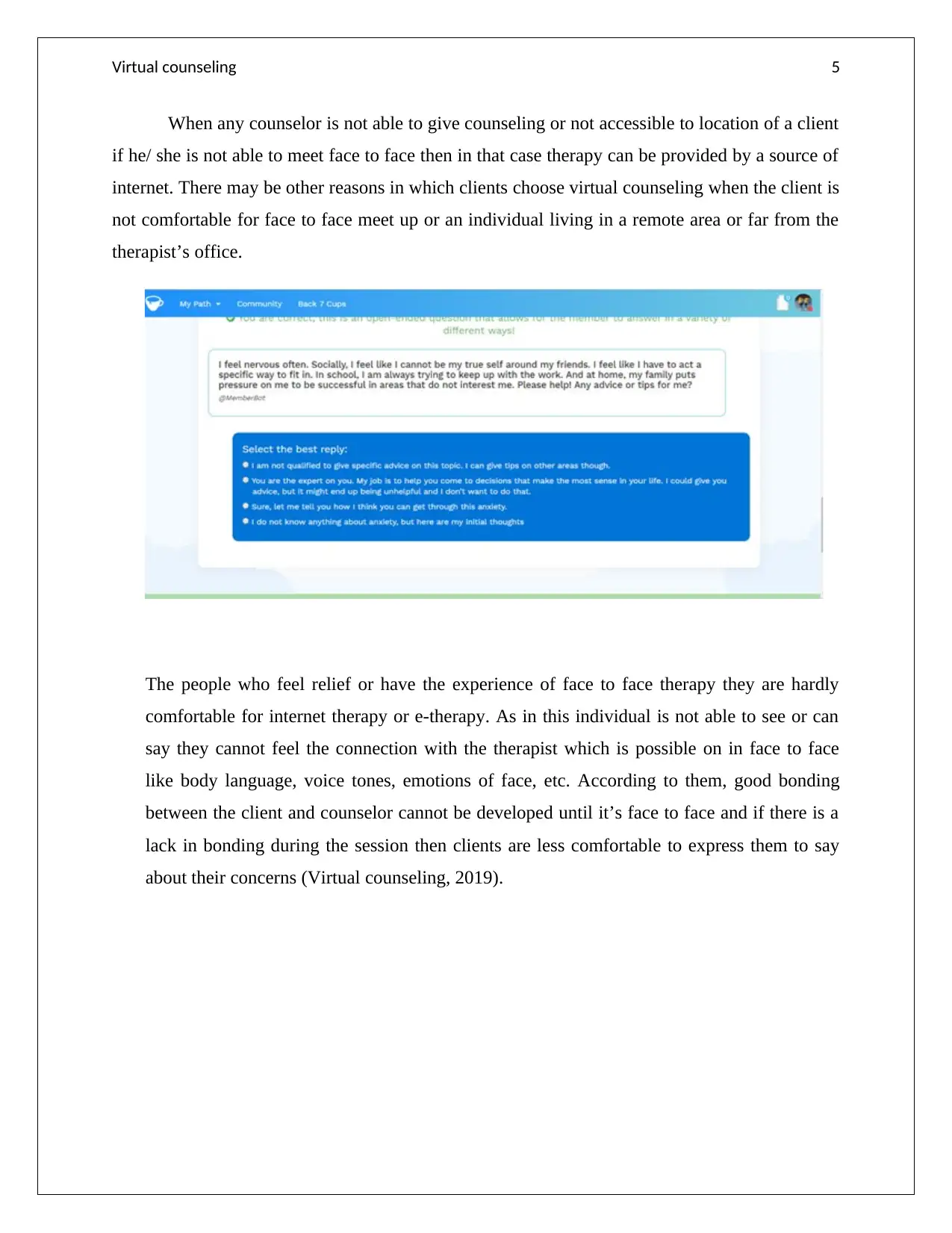
Virtual counseling 5
When any counselor is not able to give counseling or not accessible to location of a client
if he/ she is not able to meet face to face then in that case therapy can be provided by a source of
internet. There may be other reasons in which clients choose virtual counseling when the client is
not comfortable for face to face meet up or an individual living in a remote area or far from the
therapist’s office.
The people who feel relief or have the experience of face to face therapy they are hardly
comfortable for internet therapy or e-therapy. As in this individual is not able to see or can
say they cannot feel the connection with the therapist which is possible on in face to face
like body language, voice tones, emotions of face, etc. According to them, good bonding
between the client and counselor cannot be developed until it’s face to face and if there is a
lack in bonding during the session then clients are less comfortable to express them to say
about their concerns (Virtual counseling, 2019).
When any counselor is not able to give counseling or not accessible to location of a client
if he/ she is not able to meet face to face then in that case therapy can be provided by a source of
internet. There may be other reasons in which clients choose virtual counseling when the client is
not comfortable for face to face meet up or an individual living in a remote area or far from the
therapist’s office.
The people who feel relief or have the experience of face to face therapy they are hardly
comfortable for internet therapy or e-therapy. As in this individual is not able to see or can
say they cannot feel the connection with the therapist which is possible on in face to face
like body language, voice tones, emotions of face, etc. According to them, good bonding
between the client and counselor cannot be developed until it’s face to face and if there is a
lack in bonding during the session then clients are less comfortable to express them to say
about their concerns (Virtual counseling, 2019).
⊘ This is a preview!⊘
Do you want full access?
Subscribe today to unlock all pages.

Trusted by 1+ million students worldwide
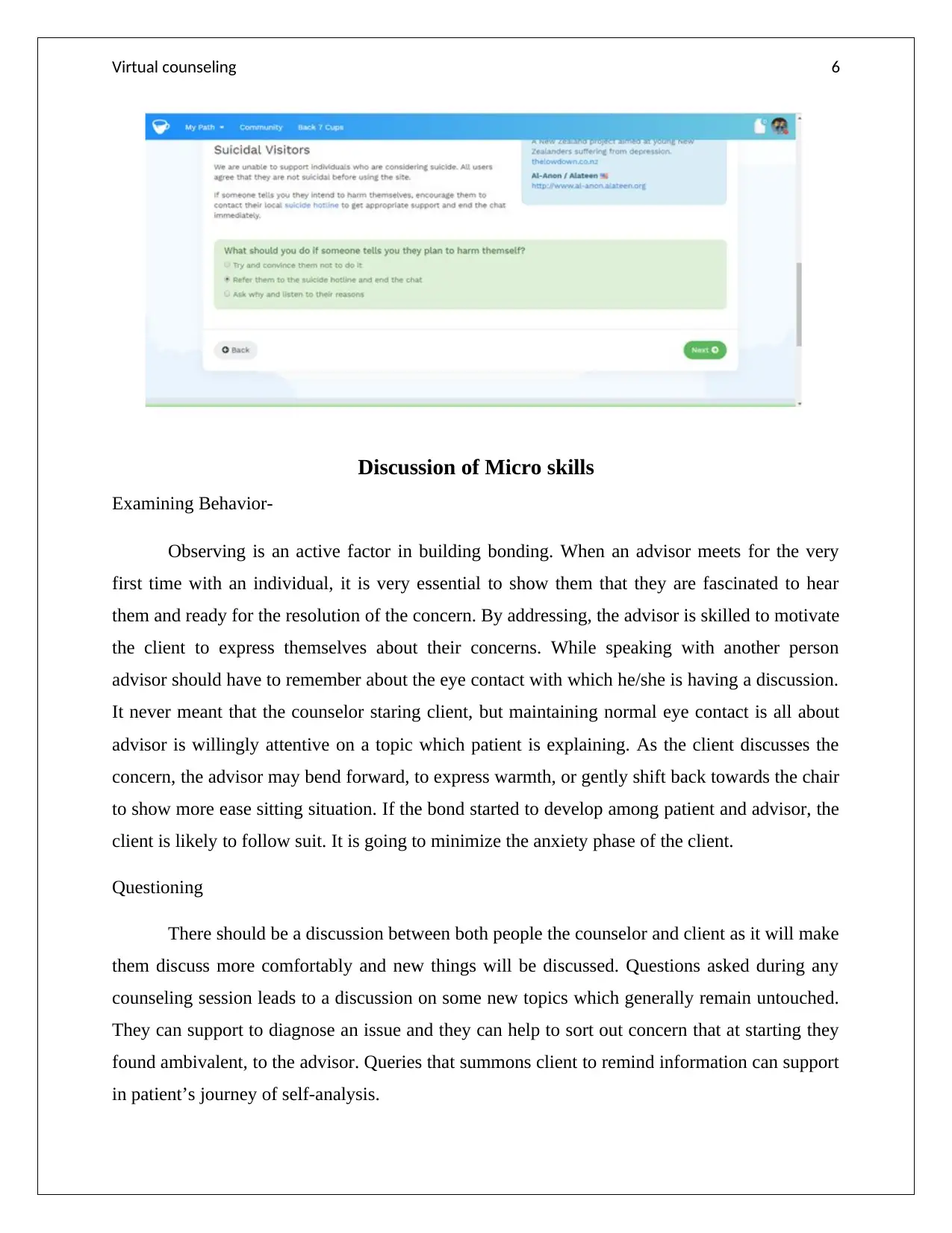
Virtual counseling 6
Discussion of Micro skills
Examining Behavior-
Observing is an active factor in building bonding. When an advisor meets for the very
first time with an individual, it is very essential to show them that they are fascinated to hear
them and ready for the resolution of the concern. By addressing, the advisor is skilled to motivate
the client to express themselves about their concerns. While speaking with another person
advisor should have to remember about the eye contact with which he/she is having a discussion.
It never meant that the counselor staring client, but maintaining normal eye contact is all about
advisor is willingly attentive on a topic which patient is explaining. As the client discusses the
concern, the advisor may bend forward, to express warmth, or gently shift back towards the chair
to show more ease sitting situation. If the bond started to develop among patient and advisor, the
client is likely to follow suit. It is going to minimize the anxiety phase of the client.
Questioning
There should be a discussion between both people the counselor and client as it will make
them discuss more comfortably and new things will be discussed. Questions asked during any
counseling session leads to a discussion on some new topics which generally remain untouched.
They can support to diagnose an issue and they can help to sort out concern that at starting they
found ambivalent, to the advisor. Queries that summons client to remind information can support
in patient’s journey of self-analysis.
Discussion of Micro skills
Examining Behavior-
Observing is an active factor in building bonding. When an advisor meets for the very
first time with an individual, it is very essential to show them that they are fascinated to hear
them and ready for the resolution of the concern. By addressing, the advisor is skilled to motivate
the client to express themselves about their concerns. While speaking with another person
advisor should have to remember about the eye contact with which he/she is having a discussion.
It never meant that the counselor staring client, but maintaining normal eye contact is all about
advisor is willingly attentive on a topic which patient is explaining. As the client discusses the
concern, the advisor may bend forward, to express warmth, or gently shift back towards the chair
to show more ease sitting situation. If the bond started to develop among patient and advisor, the
client is likely to follow suit. It is going to minimize the anxiety phase of the client.
Questioning
There should be a discussion between both people the counselor and client as it will make
them discuss more comfortably and new things will be discussed. Questions asked during any
counseling session leads to a discussion on some new topics which generally remain untouched.
They can support to diagnose an issue and they can help to sort out concern that at starting they
found ambivalent, to the advisor. Queries that summons client to remind information can support
in patient’s journey of self-analysis.
Paraphrase This Document
Need a fresh take? Get an instant paraphrase of this document with our AI Paraphraser
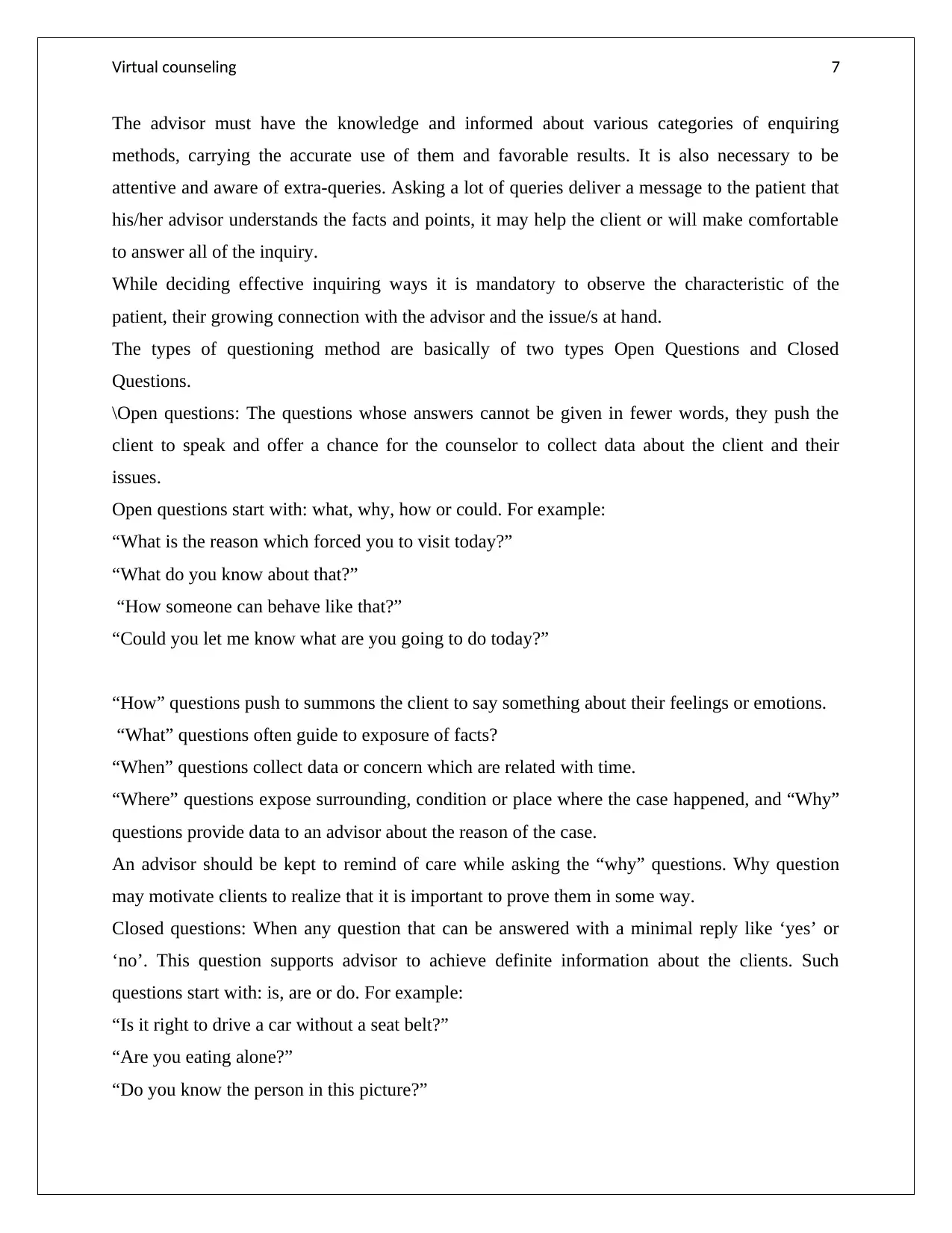
Virtual counseling 7
The advisor must have the knowledge and informed about various categories of enquiring
methods, carrying the accurate use of them and favorable results. It is also necessary to be
attentive and aware of extra-queries. Asking a lot of queries deliver a message to the patient that
his/her advisor understands the facts and points, it may help the client or will make comfortable
to answer all of the inquiry.
While deciding effective inquiring ways it is mandatory to observe the characteristic of the
patient, their growing connection with the advisor and the issue/s at hand.
The types of questioning method are basically of two types Open Questions and Closed
Questions.
\Open questions: The questions whose answers cannot be given in fewer words, they push the
client to speak and offer a chance for the counselor to collect data about the client and their
issues.
Open questions start with: what, why, how or could. For example:
“What is the reason which forced you to visit today?”
“What do you know about that?”
“How someone can behave like that?”
“Could you let me know what are you going to do today?”
“How” questions push to summons the client to say something about their feelings or emotions.
“What” questions often guide to exposure of facts?
“When” questions collect data or concern which are related with time.
“Where” questions expose surrounding, condition or place where the case happened, and “Why”
questions provide data to an advisor about the reason of the case.
An advisor should be kept to remind of care while asking the “why” questions. Why question
may motivate clients to realize that it is important to prove them in some way.
Closed questions: When any question that can be answered with a minimal reply like ‘yes’ or
‘no’. This question supports advisor to achieve definite information about the clients. Such
questions start with: is, are or do. For example:
“Is it right to drive a car without a seat belt?”
“Are you eating alone?”
“Do you know the person in this picture?”
The advisor must have the knowledge and informed about various categories of enquiring
methods, carrying the accurate use of them and favorable results. It is also necessary to be
attentive and aware of extra-queries. Asking a lot of queries deliver a message to the patient that
his/her advisor understands the facts and points, it may help the client or will make comfortable
to answer all of the inquiry.
While deciding effective inquiring ways it is mandatory to observe the characteristic of the
patient, their growing connection with the advisor and the issue/s at hand.
The types of questioning method are basically of two types Open Questions and Closed
Questions.
\Open questions: The questions whose answers cannot be given in fewer words, they push the
client to speak and offer a chance for the counselor to collect data about the client and their
issues.
Open questions start with: what, why, how or could. For example:
“What is the reason which forced you to visit today?”
“What do you know about that?”
“How someone can behave like that?”
“Could you let me know what are you going to do today?”
“How” questions push to summons the client to say something about their feelings or emotions.
“What” questions often guide to exposure of facts?
“When” questions collect data or concern which are related with time.
“Where” questions expose surrounding, condition or place where the case happened, and “Why”
questions provide data to an advisor about the reason of the case.
An advisor should be kept to remind of care while asking the “why” questions. Why question
may motivate clients to realize that it is important to prove them in some way.
Closed questions: When any question that can be answered with a minimal reply like ‘yes’ or
‘no’. This question supports advisor to achieve definite information about the clients. Such
questions start with: is, are or do. For example:
“Is it right to drive a car without a seat belt?”
“Are you eating alone?”
“Do you know the person in this picture?”
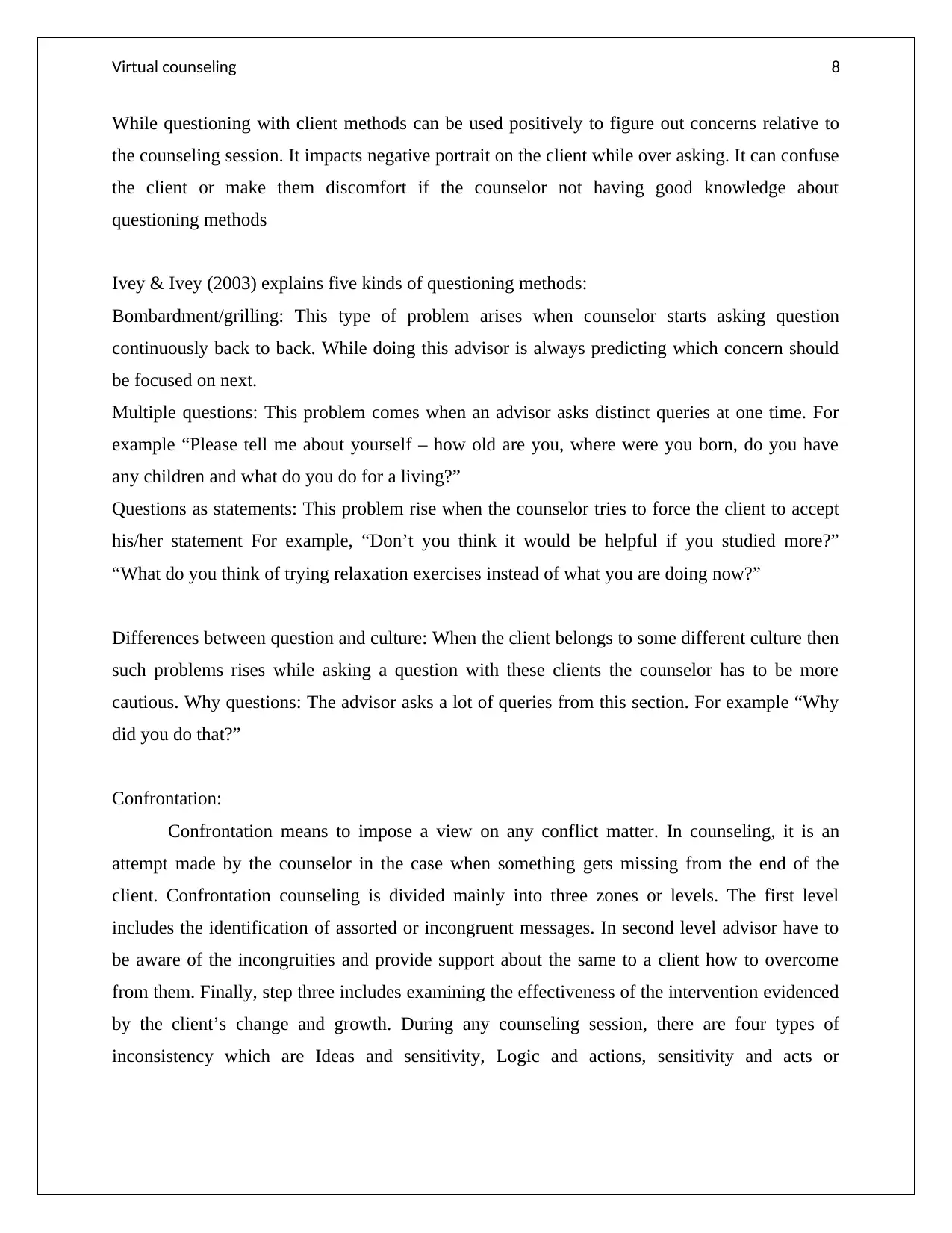
Virtual counseling 8
While questioning with client methods can be used positively to figure out concerns relative to
the counseling session. It impacts negative portrait on the client while over asking. It can confuse
the client or make them discomfort if the counselor not having good knowledge about
questioning methods
Ivey & Ivey (2003) explains five kinds of questioning methods:
Bombardment/grilling: This type of problem arises when counselor starts asking question
continuously back to back. While doing this advisor is always predicting which concern should
be focused on next.
Multiple questions: This problem comes when an advisor asks distinct queries at one time. For
example “Please tell me about yourself – how old are you, where were you born, do you have
any children and what do you do for a living?”
Questions as statements: This problem rise when the counselor tries to force the client to accept
his/her statement For example, “Don’t you think it would be helpful if you studied more?”
“What do you think of trying relaxation exercises instead of what you are doing now?”
Differences between question and culture: When the client belongs to some different culture then
such problems rises while asking a question with these clients the counselor has to be more
cautious. Why questions: The advisor asks a lot of queries from this section. For example “Why
did you do that?”
Confrontation:
Confrontation means to impose a view on any conflict matter. In counseling, it is an
attempt made by the counselor in the case when something gets missing from the end of the
client. Confrontation counseling is divided mainly into three zones or levels. The first level
includes the identification of assorted or incongruent messages. In second level advisor have to
be aware of the incongruities and provide support about the same to a client how to overcome
from them. Finally, step three includes examining the effectiveness of the intervention evidenced
by the client’s change and growth. During any counseling session, there are four types of
inconsistency which are Ideas and sensitivity, Logic and actions, sensitivity and acts or
While questioning with client methods can be used positively to figure out concerns relative to
the counseling session. It impacts negative portrait on the client while over asking. It can confuse
the client or make them discomfort if the counselor not having good knowledge about
questioning methods
Ivey & Ivey (2003) explains five kinds of questioning methods:
Bombardment/grilling: This type of problem arises when counselor starts asking question
continuously back to back. While doing this advisor is always predicting which concern should
be focused on next.
Multiple questions: This problem comes when an advisor asks distinct queries at one time. For
example “Please tell me about yourself – how old are you, where were you born, do you have
any children and what do you do for a living?”
Questions as statements: This problem rise when the counselor tries to force the client to accept
his/her statement For example, “Don’t you think it would be helpful if you studied more?”
“What do you think of trying relaxation exercises instead of what you are doing now?”
Differences between question and culture: When the client belongs to some different culture then
such problems rises while asking a question with these clients the counselor has to be more
cautious. Why questions: The advisor asks a lot of queries from this section. For example “Why
did you do that?”
Confrontation:
Confrontation means to impose a view on any conflict matter. In counseling, it is an
attempt made by the counselor in the case when something gets missing from the end of the
client. Confrontation counseling is divided mainly into three zones or levels. The first level
includes the identification of assorted or incongruent messages. In second level advisor have to
be aware of the incongruities and provide support about the same to a client how to overcome
from them. Finally, step three includes examining the effectiveness of the intervention evidenced
by the client’s change and growth. During any counseling session, there are four types of
inconsistency which are Ideas and sensitivity, Logic and actions, sensitivity and acts or
⊘ This is a preview!⊘
Do you want full access?
Subscribe today to unlock all pages.

Trusted by 1+ million students worldwide
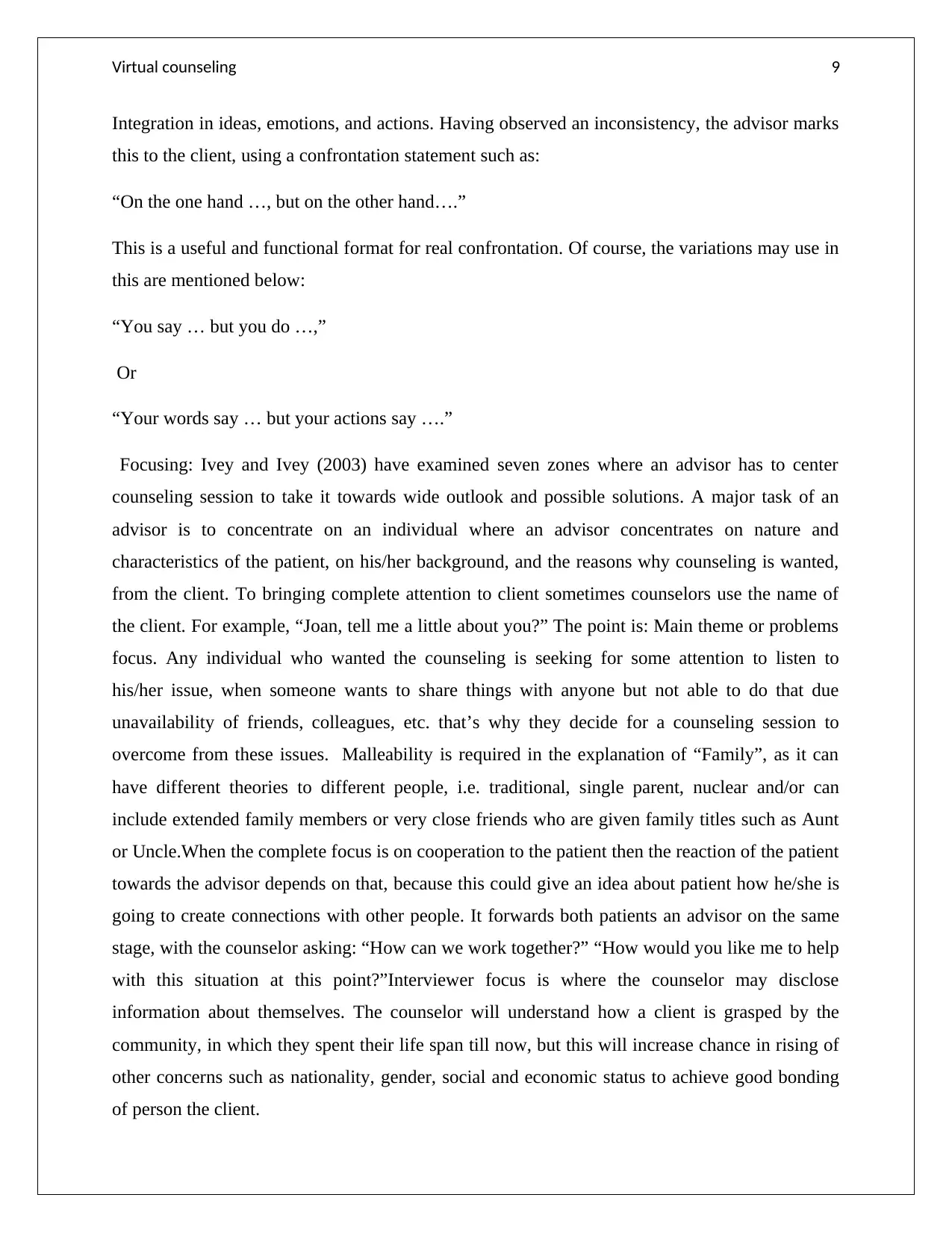
Virtual counseling 9
Integration in ideas, emotions, and actions. Having observed an inconsistency, the advisor marks
this to the client, using a confrontation statement such as:
“On the one hand …, but on the other hand….”
This is a useful and functional format for real confrontation. Of course, the variations may use in
this are mentioned below:
“You say … but you do …,”
Or
“Your words say … but your actions say ….”
Focusing: Ivey and Ivey (2003) have examined seven zones where an advisor has to center
counseling session to take it towards wide outlook and possible solutions. A major task of an
advisor is to concentrate on an individual where an advisor concentrates on nature and
characteristics of the patient, on his/her background, and the reasons why counseling is wanted,
from the client. To bringing complete attention to client sometimes counselors use the name of
the client. For example, “Joan, tell me a little about you?” The point is: Main theme or problems
focus. Any individual who wanted the counseling is seeking for some attention to listen to
his/her issue, when someone wants to share things with anyone but not able to do that due
unavailability of friends, colleagues, etc. that’s why they decide for a counseling session to
overcome from these issues. Malleability is required in the explanation of “Family”, as it can
have different theories to different people, i.e. traditional, single parent, nuclear and/or can
include extended family members or very close friends who are given family titles such as Aunt
or Uncle.When the complete focus is on cooperation to the patient then the reaction of the patient
towards the advisor depends on that, because this could give an idea about patient how he/she is
going to create connections with other people. It forwards both patients an advisor on the same
stage, with the counselor asking: “How can we work together?” “How would you like me to help
with this situation at this point?”Interviewer focus is where the counselor may disclose
information about themselves. The counselor will understand how a client is grasped by the
community, in which they spent their life span till now, but this will increase chance in rising of
other concerns such as nationality, gender, social and economic status to achieve good bonding
of person the client.
Integration in ideas, emotions, and actions. Having observed an inconsistency, the advisor marks
this to the client, using a confrontation statement such as:
“On the one hand …, but on the other hand….”
This is a useful and functional format for real confrontation. Of course, the variations may use in
this are mentioned below:
“You say … but you do …,”
Or
“Your words say … but your actions say ….”
Focusing: Ivey and Ivey (2003) have examined seven zones where an advisor has to center
counseling session to take it towards wide outlook and possible solutions. A major task of an
advisor is to concentrate on an individual where an advisor concentrates on nature and
characteristics of the patient, on his/her background, and the reasons why counseling is wanted,
from the client. To bringing complete attention to client sometimes counselors use the name of
the client. For example, “Joan, tell me a little about you?” The point is: Main theme or problems
focus. Any individual who wanted the counseling is seeking for some attention to listen to
his/her issue, when someone wants to share things with anyone but not able to do that due
unavailability of friends, colleagues, etc. that’s why they decide for a counseling session to
overcome from these issues. Malleability is required in the explanation of “Family”, as it can
have different theories to different people, i.e. traditional, single parent, nuclear and/or can
include extended family members or very close friends who are given family titles such as Aunt
or Uncle.When the complete focus is on cooperation to the patient then the reaction of the patient
towards the advisor depends on that, because this could give an idea about patient how he/she is
going to create connections with other people. It forwards both patients an advisor on the same
stage, with the counselor asking: “How can we work together?” “How would you like me to help
with this situation at this point?”Interviewer focus is where the counselor may disclose
information about themselves. The counselor will understand how a client is grasped by the
community, in which they spent their life span till now, but this will increase chance in rising of
other concerns such as nationality, gender, social and economic status to achieve good bonding
of person the client.
Paraphrase This Document
Need a fresh take? Get an instant paraphrase of this document with our AI Paraphraser
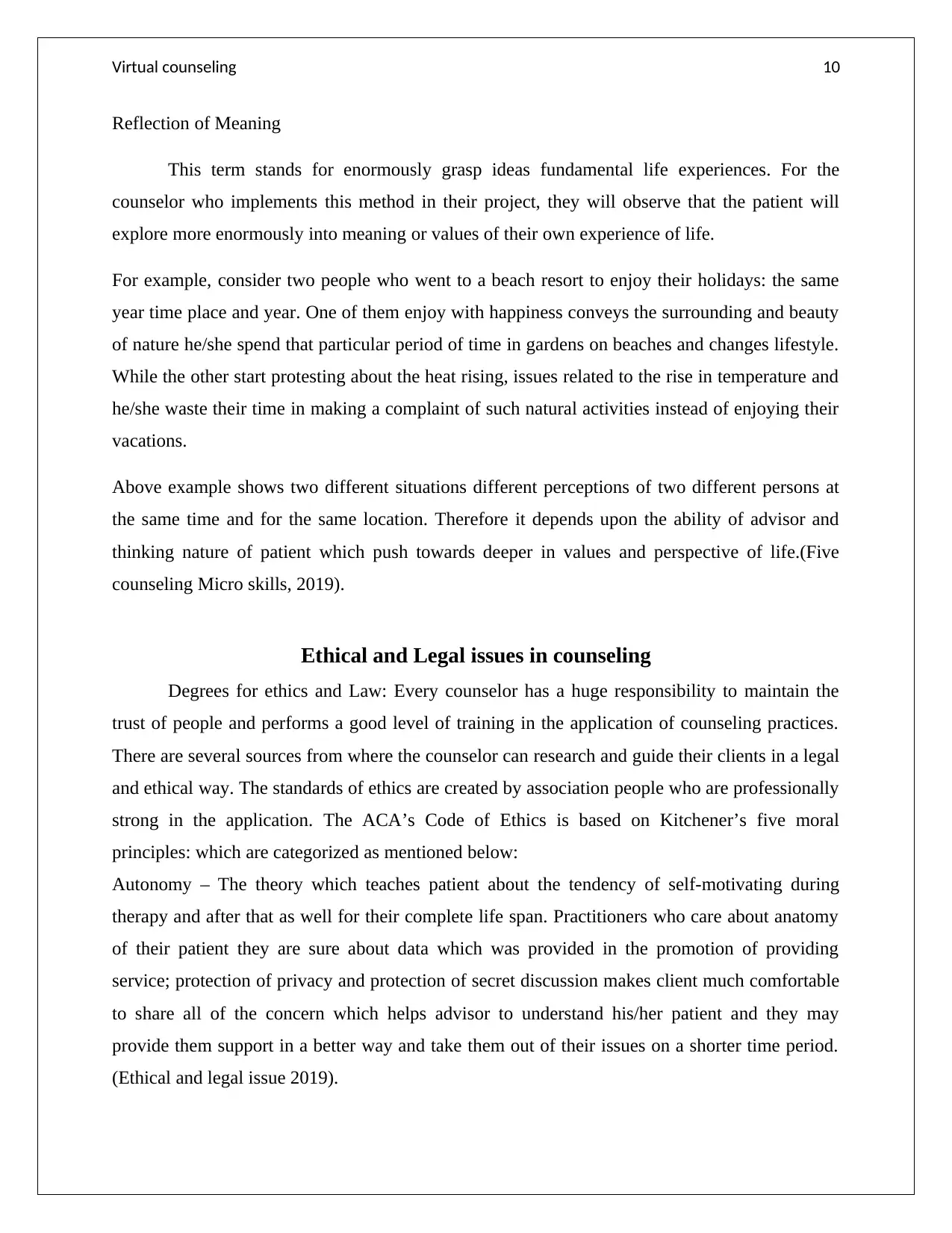
Virtual counseling 10
Reflection of Meaning
This term stands for enormously grasp ideas fundamental life experiences. For the
counselor who implements this method in their project, they will observe that the patient will
explore more enormously into meaning or values of their own experience of life.
For example, consider two people who went to a beach resort to enjoy their holidays: the same
year time place and year. One of them enjoy with happiness conveys the surrounding and beauty
of nature he/she spend that particular period of time in gardens on beaches and changes lifestyle.
While the other start protesting about the heat rising, issues related to the rise in temperature and
he/she waste their time in making a complaint of such natural activities instead of enjoying their
vacations.
Above example shows two different situations different perceptions of two different persons at
the same time and for the same location. Therefore it depends upon the ability of advisor and
thinking nature of patient which push towards deeper in values and perspective of life.(Five
counseling Micro skills, 2019).
Ethical and Legal issues in counseling
Degrees for ethics and Law: Every counselor has a huge responsibility to maintain the
trust of people and performs a good level of training in the application of counseling practices.
There are several sources from where the counselor can research and guide their clients in a legal
and ethical way. The standards of ethics are created by association people who are professionally
strong in the application. The ACA’s Code of Ethics is based on Kitchener’s five moral
principles: which are categorized as mentioned below:
Autonomy – The theory which teaches patient about the tendency of self-motivating during
therapy and after that as well for their complete life span. Practitioners who care about anatomy
of their patient they are sure about data which was provided in the promotion of providing
service; protection of privacy and protection of secret discussion makes client much comfortable
to share all of the concern which helps advisor to understand his/her patient and they may
provide them support in a better way and take them out of their issues on a shorter time period.
(Ethical and legal issue 2019).
Reflection of Meaning
This term stands for enormously grasp ideas fundamental life experiences. For the
counselor who implements this method in their project, they will observe that the patient will
explore more enormously into meaning or values of their own experience of life.
For example, consider two people who went to a beach resort to enjoy their holidays: the same
year time place and year. One of them enjoy with happiness conveys the surrounding and beauty
of nature he/she spend that particular period of time in gardens on beaches and changes lifestyle.
While the other start protesting about the heat rising, issues related to the rise in temperature and
he/she waste their time in making a complaint of such natural activities instead of enjoying their
vacations.
Above example shows two different situations different perceptions of two different persons at
the same time and for the same location. Therefore it depends upon the ability of advisor and
thinking nature of patient which push towards deeper in values and perspective of life.(Five
counseling Micro skills, 2019).
Ethical and Legal issues in counseling
Degrees for ethics and Law: Every counselor has a huge responsibility to maintain the
trust of people and performs a good level of training in the application of counseling practices.
There are several sources from where the counselor can research and guide their clients in a legal
and ethical way. The standards of ethics are created by association people who are professionally
strong in the application. The ACA’s Code of Ethics is based on Kitchener’s five moral
principles: which are categorized as mentioned below:
Autonomy – The theory which teaches patient about the tendency of self-motivating during
therapy and after that as well for their complete life span. Practitioners who care about anatomy
of their patient they are sure about data which was provided in the promotion of providing
service; protection of privacy and protection of secret discussion makes client much comfortable
to share all of the concern which helps advisor to understand his/her patient and they may
provide them support in a better way and take them out of their issues on a shorter time period.
(Ethical and legal issue 2019).
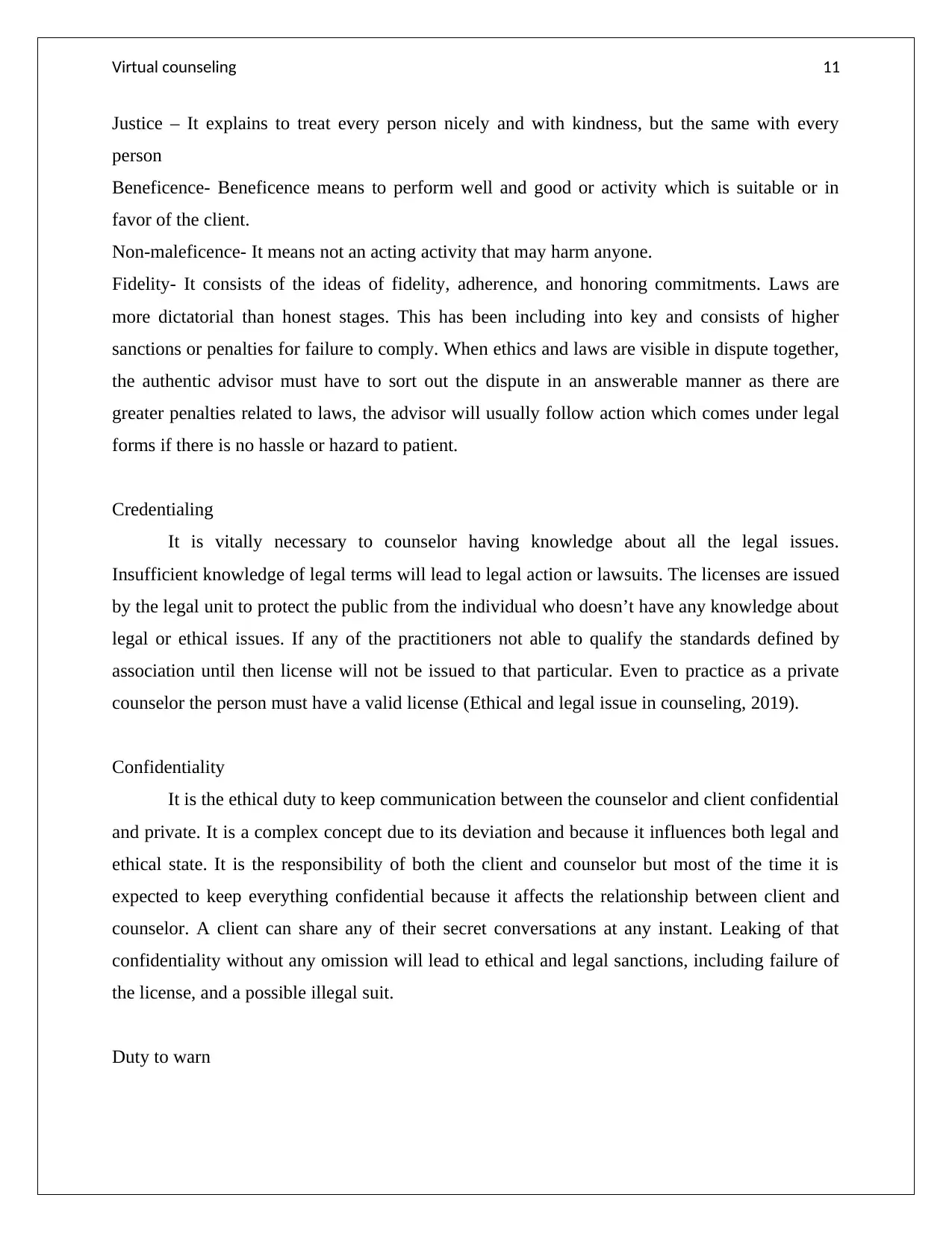
Virtual counseling 11
Justice – It explains to treat every person nicely and with kindness, but the same with every
person
Beneficence- Beneficence means to perform well and good or activity which is suitable or in
favor of the client.
Non-maleficence- It means not an acting activity that may harm anyone.
Fidelity- It consists of the ideas of fidelity, adherence, and honoring commitments. Laws are
more dictatorial than honest stages. This has been including into key and consists of higher
sanctions or penalties for failure to comply. When ethics and laws are visible in dispute together,
the authentic advisor must have to sort out the dispute in an answerable manner as there are
greater penalties related to laws, the advisor will usually follow action which comes under legal
forms if there is no hassle or hazard to patient.
Credentialing
It is vitally necessary to counselor having knowledge about all the legal issues.
Insufficient knowledge of legal terms will lead to legal action or lawsuits. The licenses are issued
by the legal unit to protect the public from the individual who doesn’t have any knowledge about
legal or ethical issues. If any of the practitioners not able to qualify the standards defined by
association until then license will not be issued to that particular. Even to practice as a private
counselor the person must have a valid license (Ethical and legal issue in counseling, 2019).
Confidentiality
It is the ethical duty to keep communication between the counselor and client confidential
and private. It is a complex concept due to its deviation and because it influences both legal and
ethical state. It is the responsibility of both the client and counselor but most of the time it is
expected to keep everything confidential because it affects the relationship between client and
counselor. A client can share any of their secret conversations at any instant. Leaking of that
confidentiality without any omission will lead to ethical and legal sanctions, including failure of
the license, and a possible illegal suit.
Duty to warn
Justice – It explains to treat every person nicely and with kindness, but the same with every
person
Beneficence- Beneficence means to perform well and good or activity which is suitable or in
favor of the client.
Non-maleficence- It means not an acting activity that may harm anyone.
Fidelity- It consists of the ideas of fidelity, adherence, and honoring commitments. Laws are
more dictatorial than honest stages. This has been including into key and consists of higher
sanctions or penalties for failure to comply. When ethics and laws are visible in dispute together,
the authentic advisor must have to sort out the dispute in an answerable manner as there are
greater penalties related to laws, the advisor will usually follow action which comes under legal
forms if there is no hassle or hazard to patient.
Credentialing
It is vitally necessary to counselor having knowledge about all the legal issues.
Insufficient knowledge of legal terms will lead to legal action or lawsuits. The licenses are issued
by the legal unit to protect the public from the individual who doesn’t have any knowledge about
legal or ethical issues. If any of the practitioners not able to qualify the standards defined by
association until then license will not be issued to that particular. Even to practice as a private
counselor the person must have a valid license (Ethical and legal issue in counseling, 2019).
Confidentiality
It is the ethical duty to keep communication between the counselor and client confidential
and private. It is a complex concept due to its deviation and because it influences both legal and
ethical state. It is the responsibility of both the client and counselor but most of the time it is
expected to keep everything confidential because it affects the relationship between client and
counselor. A client can share any of their secret conversations at any instant. Leaking of that
confidentiality without any omission will lead to ethical and legal sanctions, including failure of
the license, and a possible illegal suit.
Duty to warn
⊘ This is a preview!⊘
Do you want full access?
Subscribe today to unlock all pages.

Trusted by 1+ million students worldwide
1 out of 16
Related Documents
Your All-in-One AI-Powered Toolkit for Academic Success.
+13062052269
info@desklib.com
Available 24*7 on WhatsApp / Email
![[object Object]](/_next/static/media/star-bottom.7253800d.svg)
Unlock your academic potential
Copyright © 2020–2026 A2Z Services. All Rights Reserved. Developed and managed by ZUCOL.





